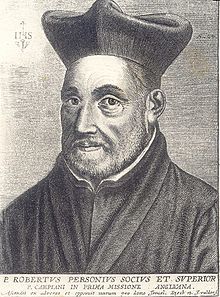1610
Death of a Jesuit conspirator
During the early years of the reign of Elizabeth I, the open practice of Catholic worship was forbidden but its adherents were not seriously troubled by the state. The queen professed a desire not to “open a window into men’s hearts”; outward obedience to the Protestant settlement would keep Catholic families safe from persecution. This policy changed after 1569 when many Catholics were moved to rebellion, urged on by the papal decree “Regnans In Excelsis” and by Jesuit theorists who argued that it was a godly deed to assassinate a heretic queen. A number of murder plots were hatched by English Catholics who hoped that by killing Elizabeth a Catholic monarch could ascend the throne.
The chief theologian of assassination and rebellion in the English context was the Jesuit Robert Persons (1546-1610), an Oxford academic who fled England and joined the Society of Jesus. In 1580 he accompanied the soon-to-be-martyred Jesuit Edmund Campion in a secret mission to his home country. When Campion was arrested Persons slipped back to the Continent and spent the rest of his career trying to provoke and justify a Catholic invasion of England and Ireland. Among his more famous works were De persecutione Anglicana (1582), Leicester’s Commonwealth (1584) and A Conference About the Next Succession (1594).
The efforts of Persons and Cardinal William Allen, the chief English Catholic in exile, were largely bent toward persuading King Philip II to launch the Spanish Armada against England in 1588. This invasion failed spectacularly and helped convince English Protestants that their Catholic countrymen were not to be trusted. Both Persons and Allen died in Rome without ever returning home.
